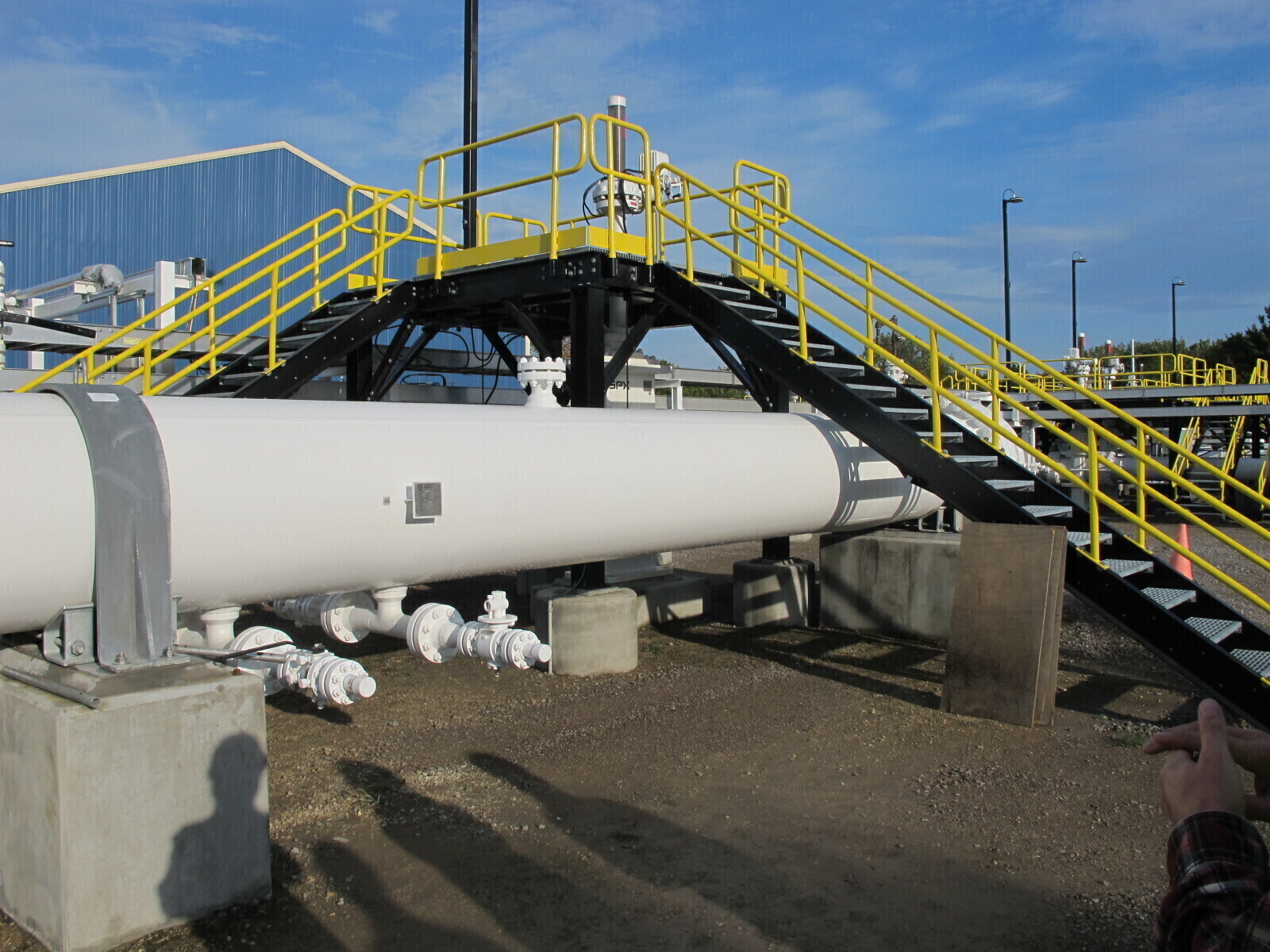
Keep up with energy-related developments in the Great Lakes area with Great Lakes Now’s biweekly headline roundup.
Click on the headline to read the full story:
Illinois:
- Illinois legislation focuses on increasing diversity in wind and solar projects – The State Journal-Register
Aiming to increase diversity in wind and solar jobs, a proposed measure in the Illinois General Assembly would require more transparent reporting on the level of participation of minority-owned businesses in clean energy jobs.
Indiana:
- Indiana getting $184.4 million for home energy assistance – Fox59 Indianapolis
The Biden-Harris Administration announced that Indiana received $184.4 million for the Low Income Home Energy Assistance Program.
This funding will help address home energy costs this winter, working to prevent shutting off utilities. The funding is a combination of an annual appropriation of $70.3 million with $114.1 million in funds from the American Rescue Plan.
- A bill would pave the way for nuclear power in Indiana – at a cost to consumers – Indianapolis Star
A new bill this legislative session creates a framework for Indiana “to move into the world” of nuclear energy, said Sen. Eric Koch, one of the bill’s main authors and chair of the Senate Utilities Committee. Koch proposed Senate Bill 271 along with Sen. Blake Doriot, R-Goshen.
The bill isn’t aimed at just any type of nuclear energy, but at what are called small modular reactors, or SMRs. These reactors are a new technology and, as the name suggests, are much smaller and more flexible than their mammoth relatives.
They are so new, in fact, that there are currently none operating in the U.S.
- Indiana bill targets banks that divest from fossil fuels, says they can’t do business here – Indianapolis Star
If you say no to doing business with fossil fuel companies, then Indiana will say no to doing business with you, according to a bill that is currently advancing through the Statehouse.
A new bill, House bill 1224, says state government cannot invest or contract with companies that “boycott” energy companies — in the case of this bill, however, energy companies means fossil fuel industries such as coal and gas.
- An Indiana carbon storage project wants the state to help protect it from lawsuits – Energy News Network
An Indiana company wants to sequester carbon deep underneath property that it doesn’t own, and it wants assurance from state lawmakers that it won’t easily be held responsible if problems arise in the future.
Michigan:
- What’s next for Michigan’s stride to clean energy? – Energy News Network
James Gignac of the Union of Concerned Scientists discusses forthcoming changes from Michigan utilities and the state’s climate solutions journey.
The city of Grand Rapids has joined 32 other state and local governments across the country in the National Building Performance Standard Coalition that the Biden administration rolled out on Jan. 22.
As a member of the coalition, Grand Rapids will be able to leverage technical support through federal agencies including the U.S. Department of Energy and U.S. Environmental Protection Agency. The program is meant to drive investment into building retrofits and create jobs that support healthier buildings and lower housing and energy costs with building performance standards.
Minnesota:
- A Minnesota co-op credits clean energy transition for stabilizing wholesale rates – Energy News Network
Great River Energy, Minnesota’s largest generation and transmission cooperative, recently announced that it would not be raising rates for 2022, and it credited wind investments and a shift from coal power.
Minnesota regulators yesterday approved the transfer of ownership of a 436-mile power line tying North Dakota’s largest coal plant to the Twin Cities, an issue that pitted coal-state interests against a state trying to wean itself from fossil fuels.
No one disputes the value of the high-voltage, direct-current (HVDC) line in the constrained upper Great Plains power grid. But the source of electricity carried from the Coal Creek Station, an hour north of Bismarck, N.D., has caused heartburn for activists pushing for bolder steps to combat climate change.
Enbridge Energy said it has stopped the flow of spilled artesian groundwater that began a year ago when workers installing the Line 3 oil pipeline in northwestern Minnesota punctured an aquifer.
The spill near Enbridge’s terminal in Clearbrook was one of the worst environmental accidents during construction of the 340-mile (547-kilometer) pipeline in Minnesota. Workers dug too deeply into the ground and the rupture resulted in a 24 million gallon groundwater leak.
Ohio:
House Bill 6 nearly halved the renewable power that utilities were required to buy, eliminated energy efficiency laws, handed a billion dollars to the state’s two nuclear power plants, and spent even more money to keep coal plants burning. A recent report from Gabel Associates, an energy consulting firm, suggests the law will cost Ohioans $2 billion in excess utility bills and $7 billion in health care costs stemming from pollution over nine years.
- Ohio regulators dismiss pleas to investigate utility power shutoffs – Energy News Network
Consumer advocates want the Public Utilities Commission of Ohio to pause utility shutoffs again and investigate after a surge in disconnections followed the lifting of a statewide moratorium earlier in the pandemic.
- FirstEnergy money trail for customer fees was muddied, new state audit finds – Akron Beacon Journal
An Ohio audit tied to the House Bill 6 scandal investigation could not detemine how FirstEnergy Corp. used nearly $460 million it collected from customers that was supposed to be spent to modernize the electric grid.
Ontario:
- Ontario cities call for clean electricity – National Observer
Despite pleas from 32 municipalities to phase out gas-fired electricity generation, the Ontario government is doubling down on the role of natural gas in keeping the province’s lights on.
More and more jurisdictions, including Quebec, Vancouver and New York City, are taking steps to ban fossil fuel heating and touting electrification to cut emissions, slow climate change and reach net-zero targets.
Meanwhile, the province of Ontario is building new natural gas heating infrastructure to serve more customers and communities, including some that have been relying on electric heat until now. And it’s making existing customers subsidize that expansion.
Wisconsin:
- Residents share mixed feelings over state’s largest proposed renewable energy plant in Dane County – Wisconsin Public Radio
Multiple residents expressed concerns about aesthetics, safety, property values and the rural character of towns within Dane County where the state’s largest renewable energy plant would be built as part of public hearing Thursday night.
Meanwhile, other residents and groups touted the benefits the project would bring to landowners as utilities seek to transition away from fossil fuels in their power mix.
National:
- Great Lakes platform helps connect green investors with regional projects – Energy News Network
The Great Lakes Impact Investment Platform features 40 projects representing nearly $4.5 billion in investment opportunities, including household energy efficiency retrofits, coal mine reclamation and solar development.
- Inside Clean Energy: As Efficiency Rises, Solar Power Needs Fewer Acres to Pack the Same Punch – Inside Climate News
Utility-scale solar power today is much more efficient than it was a decade ago in how much land it uses, according to new research.
The paper, by lead author Mark Bolinger of Lawrence Berkeley National Laboratory, is timely because utility-scale solar is a big part of plans to make a transition to carbon-free electricity, and because there have been few recent studies about solar’s efficiency in land use.
Catch more news on Great Lakes Now:
Featured image: An aboveground section of Enbridge’s Line 5 at the Mackinaw City, Mich., pump station is photographed in October 2016. Enbridge Energy moved Wednesday, Dec. 15, 2021, to shift to federal court a Michigan lawsuit seeking shutdown of the oil pipeline that runs beneath a channel linking two of the Great Lakes. (AP Photo/John Flesher, File)




